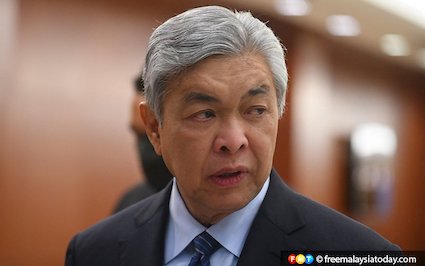Zahid does not have immunity from prosecution

(FMT) – The defence in Ahmad Zahid Hamidi’s corruption case is raising an immunity-from-prosecution claim as a disguise to strike out the charges against the former deputy prime minister, the High Court heard today.
Deputy public prosecutor Raja Rozela Raja Toran said the court could not do so without hearing all the evidence from witnesses.
“The defence is raising the immunity issue to challenge the decision of the prosecution to file charges against the accused,” Raja Rozela said in her submission at the close of the prosecution’s case.
She said the court also cannot question the public prosecutor’s discretion under the Federal Constitution to charge the accused.
Raja Rozela said the defence could have filed a judicial review before a civil court to state the accused enjoyed immunity but did not do so.
“Instead, they waited until the prosecution had closed its case to raise this immunity issue,” she said, adding that the defence did not raise any objection when Zahid was first charged in the sessions court in early 2019.
The defence is now taking the stand that Zahid ought to be immune from prosecution on the grounds that he had truthfully disclosed all the transactions related to his family-run Yayasan Akalbudi.
The Malaysian Anti-Corruption Commission (MACC) recorded Zahid’s statement where he gave details on the setting up of the foundation and its source of funds as well as provided his personal particulars and that of his family members.
Zahid is standing trial on 47 charges of money laundering and criminal breach of trust (CBT) involving funds from Yayasan Akalbudi and accepting bribes for various projects during his tenure as the home minister.
His lead counsel Hisyam Teh told the court on Sept 6 that Section 30(7) of MACC Act was applicable in Zahid’s case when the authorities took his statements in July 2018.
The provision, which was repealed on Oct 1, 2018, had stated that anyone who disclosed information or produced any document to the authorities would not be incriminated.
Raja Rozela said the defence was giving a literal reading of the provision and, if accepted, this would lead to an absurdity and run contrary to the intentions of Parliament in passing laws.
She said Section 30(7) compelled any person to answer questions by a MACC investigating officer or else be liable for an offence even if the person told a lie.
Raja Rozela said this provision only applied, for example, to a civil servant who had information of a fraud practice contained in confidential documents.
“This civil servant will be granted immunity from prosecution under the Official Secrets Act (OSA) as he may not be authorised to view the classified document,” she said.
Raja Rozela said the MACC investigating officer had taken into account all information and statements provided by witnesses before proposing charges against the accused.
“The accused here cannot be exempted from prosecution just because he gave information. Others have given statements that incriminated him (Zahid),” she said.
Raja Rozela added that if the provision were to be used merely to collect information, then the MAcC would be made impotent in its role to fight corruption.
“The anti-graft agency will be rendered useless and incompetent, and limited to collecting informaton about corrupt practices but do nothing beyond that,” she said.
Raja Rozela added that the MACC and the prosecution did not mislead the accused to believe that he would not be charged.
Hearing before trial judge Collin Lawrence Sequerah has been adjourned to Oct 4.

